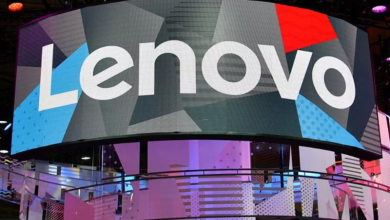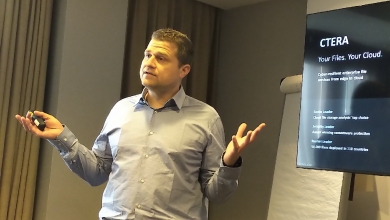
IT Europa is currently attending the IT Press Tour across the Tel Aviv, Israel area, to meet companies who are providing global markets with data storage and security products.
Most of them are relying on the channel in one form or another to deliver their products and services, and IT Europa discovered what their latest strategies were.
Pliops bills itself as the "GPU of storage" , with its Extreme Data Processors (XDPs). It is already in partnership with Western Digital to develop solutions, and customers include a 'US top five Saas provider', hyperscale cloud service providers, and social media companies, all of whom use Pliops' chips and cards in their data centres.
The firm maintains it wants to become a "mini Arm", supplying its technology to everybody, anywhere. To help do this it already has a relationship with TD Synnex, and now says it is developing a " price per instance' offering that would work in a similar way to HPE's Greenlake on-demand service, and which could be sold by MSPs.
HYCU
HYCU is in various cloud data management markets and has seen impressive sales growth through MSPs over the last couple of years.
It is enhancing its offering through various new security tools, not least its R-Score assessment, which helps customers measure their readiness for ransomware attacks.
R-Score has been developed with security firm Mandiant, among others, and is being provided as a free service to existing HYCU customers.
The company says it is supporting service providers to deploy more third party security services around its own data management products, for example zero trust network access technologies, without taking any service revenues itself from such deals.
And it is now offering MSPs, MSSPs and CSPs R-Score certification, to allow them to actually sell R-Score as-a-service along with their other offerings.
As cyber assurance policies are now "sky high" , says HYCU, this opportunity is expected to prove fruitful, as end-customers scramble to mitigate the increasing ransomware threat.
Model9
Model9 offers cloud data management for mainframes, and is a co-sell partner with mainframe leader IBM.
Model9 maintains that mainframes still hold 80% of the world's mission critical business data, whether it's from banks, telcos or utility companies.
It says that while the number of mainframes is going down, the amount of data stored on them is actually going up. Its technology allows that data to be managed and backed up in the cloud, eliminating tape and backup hardware, using a hybrid cloud infrastructure.
As well as IBM, its services spin-off Kyndryl is also taking a close look at the business opportunities offered by Model9. Another partner that has come on-board recently includes cloud data management vendor Cohesity, with SIs like Accenture, DXC and Infosys already being partners.
The software that Model9 offers is proprietary and the margins on it are high, according to a typical project use case presented to the IT Press Tour. An advantage for customers though is that it is a "low code" solution, meaning that customers can "democratise" the data cloud amidst a mainframe skills shortage.
Speedb
Speedb is a startup that offers a "next gen data engine" , and after originally sticking to proprietary technology like Model9, it has just chosen to go open source to help its scale-up effort.
The data handling technology is said to help improve operations, while at the same time deliver cost savings without users having to make any significant changes to their apps or underlying infrastructure.
With the open source move, the target market is the developer, with the premise that the software will grow organically across the development community.
It is expected that this will result in enhancements to the product being created in the ecosystem, and that both Speedb and service providers will be able to sell services around the technology, including in deployment services and on-going support.
Speedb has already started an OEM programme for the data engine and is working on developing a "price per node" subscription business.
The firm currently employs 20 and expects to double this by the end of the year. While it provides remote product support from Israel for now, it will hire other business operations staff on the ground in major Western markets going forward.
CTERA
CTERA, the established distributed cloud storage vendor, said it was expanding the security features wrapped around its platform, that its growing partner base would be able to take advantage of.
As part of its "cyber hardened storage" approach, it is delivering continuous replication, proactive alerts, support for zero trust network access and self-defending technology against ransomware, all to achieve "instant recovery" following attacks.
Some of these efforts are supported by CTERA's recent alliance with security vendor Varonis, but it has made a big play around its Insight tool, which is a time-based trend analysis system to help quickly discover and tackle vulnerabilities in data stores, including at the evolving and expanding edge.
Insight will be developed over the year, as the company also develops its channel alliances further, with the help of wider accreditation and other new tools to come.
The likes of Orange Business Services and Fastweb are already established partners in Europe, and others are expected to get involved with the vendor as it widens its data security offer.
Infinidat
Data storage firm Infinidat reported 40% year-on-year growth for 2021, as it sets out to widen the capabilities of its InfiniGuard security platform that supports its main InfiniBox storage offering.
This includes improving its ransomware protection, which it has developed itself. Infinidat makes big noises about the scalabiity and reliability of its systems, and Germany-headquartered IT and cloud services provider Bechtle gave a presentation to the Tour, about how the vendor got it out of a storage hole.
Bechtle took delivery of a new storage system that was supposed to support its cloud services unit. The system simply didn't work properly from almost the beginning though, with Bechtle actually losing some customers as a result.
This provider is one of the biggest storage providers in the world, with a very wide portfolio of legacy on-premise and storage as-a-service offerings.
"We had to replace this system with Infinidat, as the frequency of the faults led to a loss of trust among our customers," said Bechtle.
It also added that other well-established legacy storage vendors, that were considered, and which were backed by some Bechtle staff, were unable to deliver a replacement system quickly enough.
Bechtle says it benefited from a new member of staff joining the firm, who knew what Infinidat could offer.
"The replacement was delivered flexibly, and now provides easy management, high performance and reliability," said Bechtle.
IT Europa has found out who the provider of the failed system was, but Bechtle has asked us not to name them, to save that vendor's embarrassment.
By Antony Savvas


